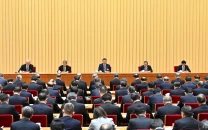Evolving technology skills for next-generation leadership
Most impactful leaders of our time are those who mentor, inspire, and lead with clarity through complexity

"You can have nothing in your pocket, and only the clothes and the shoes you wear, but if you have a well-educated mind, you will be able to seize the opportunities life offers you and start all over again." (His Highness the Late Aga Khan IV).
Born in the remote village of Hunza, Gilgit Baltistan, my journey has been shaped by the power of education, continuous learning, and the guidance of mentors. That journey instilled in me a deep belief that skills, especially when rooted in values, can change lives. I bring that same conviction and resilience to every role I undertake.
We are living through a time of extraordinary transformation. Artificial intelligence, digitalisation, and socio-economic disruption are redefining what it means to lead, work, and succeed. In this fast-evolving landscape, progress is no longer measured solely by wealth or infrastructure; instead, it is driven by knowledge, adaptability, and the mastery of emerging technology skills.
Technical expertise, once considered the cornerstone of a successful career, is no longer adequate on its own. The leaders of today and tomorrow must blend digital fluency with deeply human capabilities. A strong foundation in AI, machine learning, cybersecurity, and digital ethics is now essential. Equally critical is the ability to make sense of data, to tell its story, and to use it to drive decisions.
But these competencies must be underpinned by agile thinking, emotional intelligence, and a deep sense of empathy. The modern workplace demands more than capability – it demands character. The real question is no longer, "Can you code?" but rather, "Can you solve complex, real-world problems through technology while uplifting those around you?"
Leadership, like technology, must continuously evolve. The most impactful leaders of our time are not those who merely manage – they are those who mentor, inspire, and lead with clarity through complexity. Across my engagements with institutions from the USA to China, I’ve witnessed a profound transformation in leadership expectations. Hierarchies are giving way to collaboration. Authority is being redefined through authenticity and trust. The fear of failure is slowly being replaced by a culture of experimentation and learning.
The most forward-looking leaders today are not afraid to embrace uncertainty. They nurture teams that learn through iteration, that grow through feedback, and that thrive not in spite of failure but because of it. These leaders champion purpose over process and empower others to do the same.
My career has afforded me the opportunity to lead digital transformations at scale, from the high security innovation ecosystems of Lockheed Martin to the complex public health systems of the NHS, and the globally inclusive educational mission of the Aga Khan University. Across these varied landscapes, one truth stands out, the most scalable and sustainable solutions are not developed by isolated experts, but by diverse, inclusive teams working with shared intent.
In today’s interconnected world, we no longer need technologists who operate in silos. We need multidimensional thinkers – those who understand the educator’s empathy, the policymaker’s foresight, and the entrepreneur’s drive. We need professionals who see the entire system, not just the technical solution.
During the World Cup, after Japan’s final match, fans remained in the stadium not to celebrate, but to clean. Their coach, Hajime Moriyasu, bowed deeply to the crowd not in defeat, but in gratitude. In that simple, silent gesture, we witnessed a profound lesson in leadership. It was humble, dignified, and human.
Even in loss, there was grace. Even in disappointment, there was integrity. That moment reminds us of those skills, however advanced, must be anchored in values. Without humility, even the greatest talent loses meaning.
In an age of AI augmented thinking and algorithmic efficiency, our greatest need isn’t just smarter machines, it’s wiser people. To lead in this new era, we must strengthen not only our technical abilities, but our cultural intelligence, moral compass, and resilience. We must learn to craft narratives that unite while collaborating across disciplines. We must lead with courage, empathy, and vision.
Whether we are implementing AI in universities, reimagining healthcare delivery, or transforming public service institutions, one principle remains unchanged, an educated mind is still the most powerful operating system in the world.
So, I leave you with a simple question: What are you doing with your skills?


























COMMENTS
Comments are moderated and generally will be posted if they are on-topic and not abusive.
For more information, please see our Comments FAQ